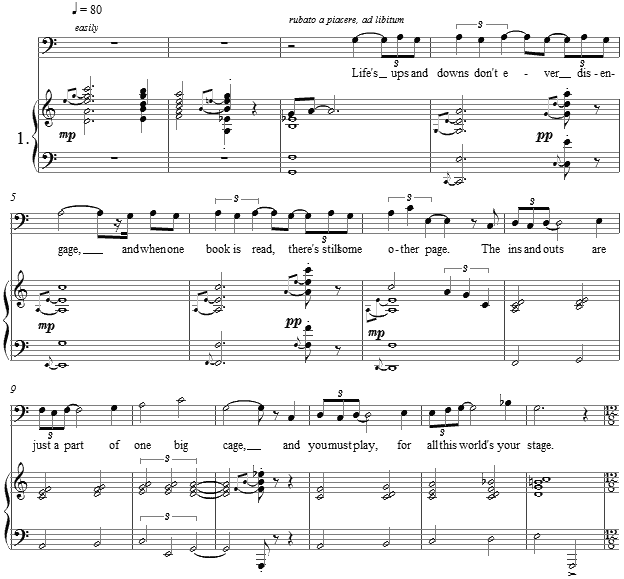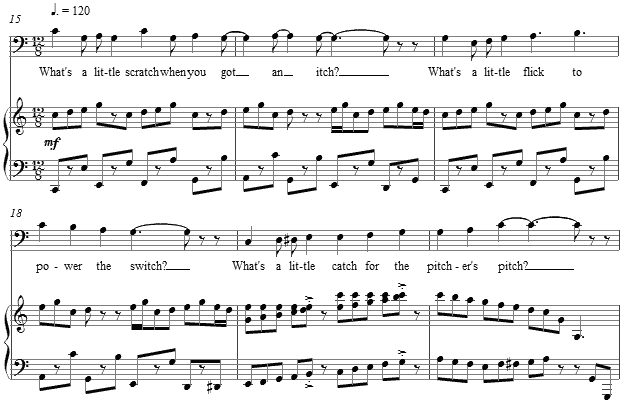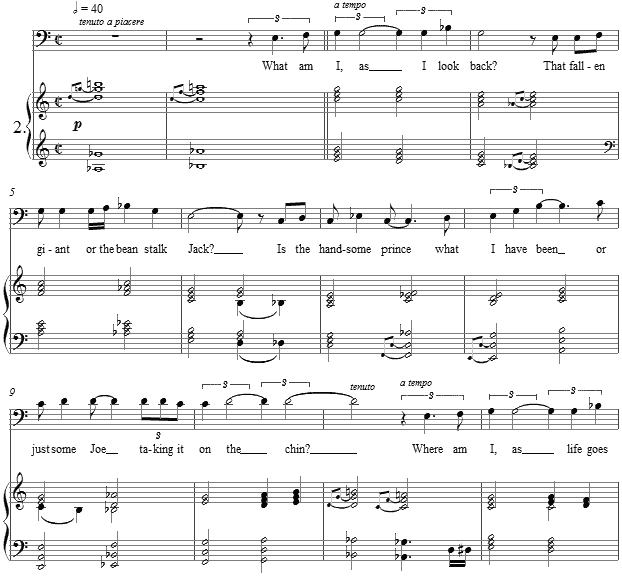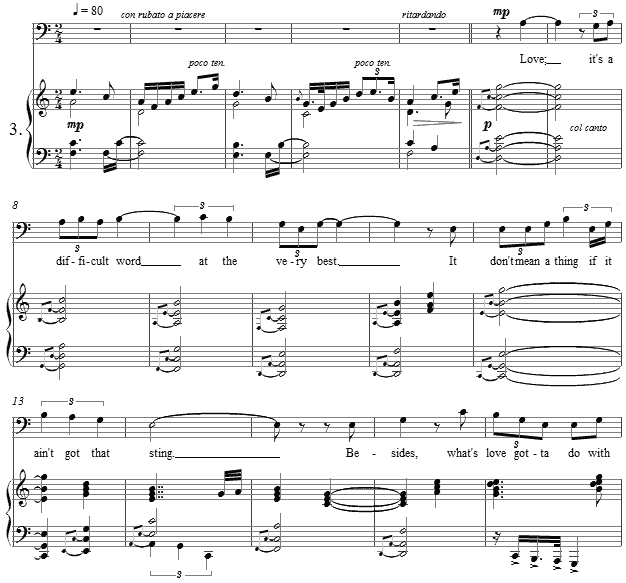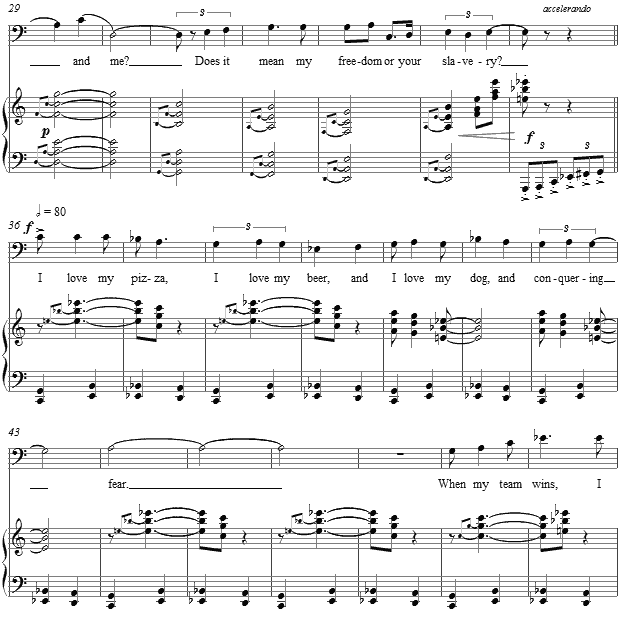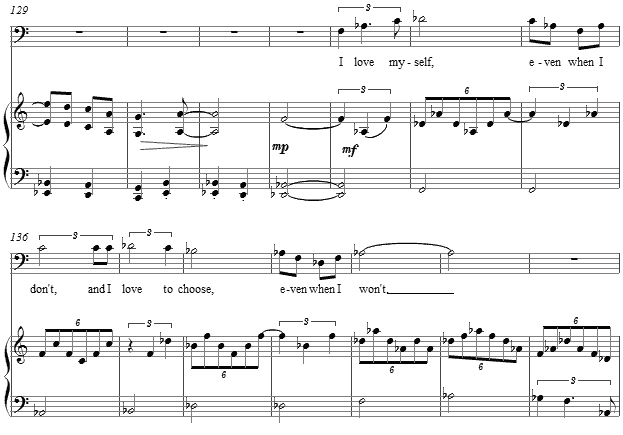Music and Texts of GARY BACHLUND
Vocal Music | Piano | Organ | Chamber Music | Orchestral | Articles and Commentary | Poems and Stories | Miscellany | FAQs
Three Songs for Roger - (2009)
texts by the composer
for baritone and piano
for Roger Bourland
i. Life - [ 7 pages, circa 3' 20" ]
Life's ups and downs don't ever disengage,
And when one book is read, there's still some other page.
The ins and outs are just a part of one big cage,
And you must play, for all this world's your stage.
What's a little scratch when you got an itch?
What's a little flick to the power switch?
What's a little catch for the pitcher's pitch?
What's a little gloom when your life's a bitch?
One comes with the other one, that's for sure.
For most every illness there seems some cure.
If you start with one, you'll deal with two,
'Cause that's what life has made for you.
What's a soothing balm for each ache and pain?
What's a plumber's plunger to that backed-up drain?
What's a little bleach to the red wine stain?
What's a changing wind to the weathervane?
One comes with the other one, I'll tell you true.
For any one thing there comes the cue
That you'll play with one, but romp with two,
'Cause that's how life was made for you.
What's a fitting answer to every little plight?
What's the color black to the color white?
What's a bumpy tumble from some lofty height?
What's a workman's wrench when the nut's too tight?
What's a little lovin' when you're feeling fine?
What's the thing that's yours that is also mine?
What's the dark of night when the sun does shine?
What's that giant puzzle? Read between each line.
One comes with the other one, I'll say it straight.
For any one thing, like love or hate,
You will sport with one, but war with two,
'Cause those are the rules life's made for you.
ii. Who Am I? - [ 3 pages, circa 2' 30" ]
What am I, as I look back?
That fallen giant or the bean stalk Jack?
Is the handsome prince what I have been
Or just some Joe taking it on the chin?
Where am I, as life goes by?
A Gulliver's traveling kind of guy?
I've been lost but I've been found,
And I've been loosed, though once was bound.
Was I the tailor killing flies
But also that dragon's last surprise?
Are all my stories quite the same?
I'm due the praise and due the blame.
Who and what and why, I ask,
While taking off each story's mask?
Who am I, as I take and give?
Why exactly do I live?
Who am I, as life goes on?
The ugly duckling and a graceful swan?
Who am I, each day I live?
What is it that I might give?
iii. Love - [ 8 pages, circa 3' 50" ]
Love; it's a difficult word at the very best.
It don't mean a thing, if it ain't got that sting.
Besides, what's love gotta do with it?
Pop stars holler and sell a hit,
But it could as well be in a grade school skit.
What does love mean to you and me?
Does it mean my freedom or your slavery?
I love my pizza, and I love my beer,
I love my dog, and conquering fear.
When my team wins, I love to cheer,
And when they lose, I love to jeer.
I love to cuss, and I love to grouse;
I love to laugh, and I love my spouse.
To love so many things is great,
That even I can love to hate.
I love bein' right, and I love bein' seen
In all the right places, or in between.
I love to fight when the time is right,
And the time seems right both day and night.
I love myself, even when I don't,
And I love to choose, even when I won't.
I love to love to love to love,
And especially when push comes to shove.
So what does all this lovin' mean?
Is love from God or just a chromosomal gene?
Is love its very own opposite?
Is love so fine though sometimes shi....?
Oh, I love my pizza, and I love my beer,
I love my dog, and conquering fear.
So, come what may, this much seems clear,
Love's here to stay, from what I hear. [ 1 ]Copyright © 2009 Gary Bachlund All international rights reserved.
[ 18 pages, circa 9' 40" ]
Roger Bourland
I received a request in 2009 from Roger Bourland, professor of composition and chairman of the Music Department at UCLA, asking for some texts by which he would challenge a student with something new. Roger wrote me teasing that I was some "word-meister" and that he was hoping for texts which would be "something on the way to a musical" and in a "a fast-slow-fast set." He added, "Have them be texts that YOU would like to set as well, and feel free to set them yourself." Therefore yesterday, the 16th of January, I wrote the three texts and set two, with the last in the set composed today, the 17th. I have felt "free to set them" myself therefore, and they are dedicated to Roger.
His blog, www.rogerbourland.com/blog/ , has been among the top 50 classical music blogs for several years. In one entry, he wrote, "Songs are usually “about” something, such as love, or no love, or springtime and so forth." So these songs are about life and love, perhaps viewed though the empty bottom of a martini glass, but mostly they are about having fun with words and music.
I take exception to Roger's observation and distinction, found on his blog, that song writers and composers are two different animals, songwriters being miniaturists. Given the "miniature" 24 minutes of a single song -- my The Hoard of the Gibbelins -- as compared to the truly miniature Small Homes lasting a mere 35 seconds, the range of "miniature" need be clarified. But then I was never a particularly easy student....
The first is a musing about life in the form of many questions. Coming out of the tradition of "blessings and curses" from Deuteronomy through the Beatitudes, whose curses are implicit in the meaning, I thought to put together the profound alongside the profane. The opening is a simple introduction marked ad libitum for the performers.
The up tempo begins this litany of questions, romping through a 12/8 reminiscent of a gesture from the song "Nola," which came to mind as I thought about the last conclusion of Iago's "Credo in un dio crudel" from Verdi's Otello, in which this villain sees "nothing." "Nulla." Ergo a pun by the musical reference. Go figure. The verses and refrains twist into the relative natural minor before returning to the tonic major, with a short play off at the conclusion.
The slow middle setting is also a set of questions, differing in their seriousness and linked to images from various fairy tales. This set of verses is a simple hymn form with variations.
The last text is meant as the final "fast," though it too opens with a rubato musing. Some slight references in both text and melodic shapes point to 20th century popular music about love and music as a joke within this large ironic meditation on all the things "love" is used to express in these modern times.
The up tempo is a hard driving 2/4 with the major-minor chords decorating a walking bass line, over which syncopations play out in the vocal line. It is meant to be aggressive, a joke about what it means to be male in a society which sometimes attacks this meaning in a variety of unsuccessful ways.
A diversion into the lowered supertonic morphs into a quasi-waltz for the span of one verse in text, before dropping again into a reprise of the opening rubati, and final drive to a conclusion that "come what may, this much seems clear, / Love's here to stay, from what I hear."
The score for Three Songs for Roger is available as a free PDF download, though any major commercial performance or recording of the work is prohibited without prior arrangement with the composer. Click on the graphic below for this piano-vocal score.
NOTES
[ 1 ] "There are several kinds of love. One is a selfish, mean, grasping, egotistical thing which uses love for self-importance. This is the ugly and crippling kind. The other is an outpouring of everything good in you—of kindness and consideration and respect—not only the social respect of manners but the greater respect which is recognition of another person as unique and valuable. The first kind can make you sick and small and weak but the second can release in you strength, and courage and goodness and even wisdom you didn’t know you had." In a letter from John Steinbeck to his son, Thom, 10 November 1958. (Steinbeck: A Life in Letters, Penguin Classics, 1989)

